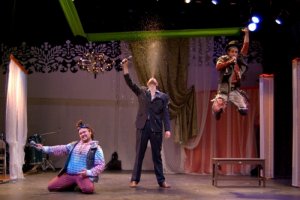If Music Be the Food of Love, Rock On
Hot- Twelfth Night
- by William Shakespeare
- The New York Neo-Classical Ensemble
- January 8 - 24, 2009
| Acting |  |
| Costumes |  |
| Sets |  |
| Overall |  |
It’s expected, these days, to “update” Shakespeare productions either to prove the Bard’s continuing relevance and/or to attract new (younger) audiences. But too often the new settings are just gimmicks; setting Romeo and Juliet in Los Angeles or Hamlet in the sixties, or deciding that Antonio from The Merchant of Venice is a stockbroker are all just arbitrary unless they are somehow meaningfully connected to the text. If directors want to find ways to successfully keep Shakespeare hip, they should take a cue from New York Neo-Classical Ensemble’s most recent show, which actually deigned to not just transpose a modern setting onto the text, but rather to develop it into a fully fleshed out production concept. Of all of Shakespeare’s comedies, Twelfth Night is the one in which music plays the largest role – in fact, the play’s first spoken line refers to music’s emotional power. NYNEO’s choice, then, to set the play in a youth culture largely defined by its music succeeds in ways many Shakespeare “updates” do not.
In director Stephen Stout’s delightful production, the “food of love” is indie rock. The original score by Matthew roi Berger (who also plays Sir Toby in this production) uses Shakespeare’s lyrics and is so good, so authentic, and so well-incorporated into the show’s hipster vibe that it’s easy to feel the music is being performed by a band so cool no one’s even heard of them yet. From this base, the rest of the production comes naturally. Jessica Pabst’s costume design is dominated by skinny-jeans and Converse; line delivery is snarky and modern (my one complaint, here, is that the verse is often ignored), and the characterizations all take their cues from personages familiar to anyone who’s ever lived in a trendy neighborhood.
The setting also manages to dictate which issues the show is able to tackle; it only makes sense, after all, that a play that uses cross-dressing as a major plot device should explore the politics of sex and sexuality. There is no attempt to preserve the original meaning of Antonio’s lofty praise and proclamations of love and adoration: in this production, he is in love with Sebastian, which only serves to heighten his perceived betrayal in Illyria. Feste, the fool, is another gay character, and he often uses his aggressive sexuality to keep other characters on their toes. His method of discovering that Duke Orsino’s servant is, in fact, two different people is more than a bit…hands on. Perhaps most interestingly, though, this production addresses the problem of Orsino and Viola’s relationship: in order for Orsino’s love of Viola to be credible at the end of the play, there has to be some sort of attraction early on, even when Viola is disguised as a man. In a wonderfully directed and beautifully acted scene, the disguised Viola sits with Orsino, listening to Orsino’s band jam. It’s agonizing; the attraction between Viola and the very confused Duke crackles as they rough-house, and when the inevitable kiss finally comes it explodes with all the complicated emotion involved on both sides. The scene also succeeds in making Orsino a much more likeable character, and in making the play’s resolution much more enjoyable.
There is also the question of those characters that inevitably end up alone. In the play, Sir Andrew Aguecheek is not really reprehensible, just stupid; Malvolio is abused beyond any reasonable bounds of practical joking, far out of proportion to any offense he’s committed, and it’s all just laughed off. This production’s Antonio is faithful, true, and has proven himself many a time to a Sebastian that seems, at times, to lead him on. Each of these characters pursues love and the promise of being loved in return, only to wind up with zilch. Stout’s production neither waves them off, nor accepts that these characters just stop appearing in the script. In the elaborate dance number that closes the show—yes, you read that correctly—Andrew, Antonio, and Malvolio wander about, alone together, put off by the couples’ insensitive antics. Feste, too, winds up alone, but in the end when he is entreated to go and make peace with Malvolio, who has just sworn revenge, he does nothing but watch the man leave, implying that deep down, perhaps the Fool has more in common with Malvolio than he lets on. These discussions lend the thematic depth needed to earn the colorful silliness of the rest of the production.
Corinne Donly is a lot of fun to watch as Viola, as she’s managed to take the production concept to heart and run with it. One gets the sense that she’s unafraid to take chances on stage—to really play—which makes her funnier moments sparkle with energy and her more heartfelt or anguished moments, which she also plays well, all the more painful. Her counterpart, Richard Douglass, is able to capture a real innocence and clear-eyed goodness in Sebastian that helps us to get to know and like him despite the fact that he has significantly less stage time than his sister. When he finally gets to town and begins to be mistaken for his disguised twin sister, Douglass gets laughs from just the wordless expressions of confusion and stupefaction his character displays as he tries to understand what’s going on around him—when Olivia inexplicably seeks his love (and his body), he has no idea what's going on, but what's so funny is that he doesn't much care.
Robbie Collier Sublett’s Orsino is simmering and brooding, but he should perhaps be advised that speaking the verse rapidly is not the same as expressing the verse effectively; in fact, it often makes him more difficult to understand. The team of Matthew roi Berger (Toby Belch), Cale Krise (Andrew Aguecheek), and Daliya Karnofsky (Maria) is loud, vulgar, and hilarious, but perhaps the most interesting aspect of their scenes are Berger’s explorations of Toby’s darker side—when he rails against Malvolio (Bill Griffin), we learn more about his character than we do, perhaps, about any of his cohorts, and both he and Stout deserve a lot of credit for their willingness to go there in one of Shakespeare’s more unmitigated comedies.
As is so often the case, however, the fool steals the show: Brandon Uranowitz’ effortless command of the language and, again, his willingness to explore his characters’ depth makes him absolutely spellbinding. It helps, of course, that he sings most of the show’s songs.
NYNEO’s Twelfth Night is far from traditional, but it takes risks that pay off. Every choice is interesting and intelligent, derived from the text and a good concept, and not merely from a compulsion to update Shakespeare. And those new (young) audiences? I saw the show on a Saturday night, and the theater was completely packed, primarily by lively, enthusiastic people under thirty. As I was leaving the theatre, I heard a girl who couldn’t have been older than ten say to her mother, “That was amazing! That was the best show ever! Can we come see it again?” Praise doesn’t come much higher than that.
Click the links below to listen to audio samples from the show
Discuss this review or play in our forums
Reviews on this site are subject to this required disclosure.











